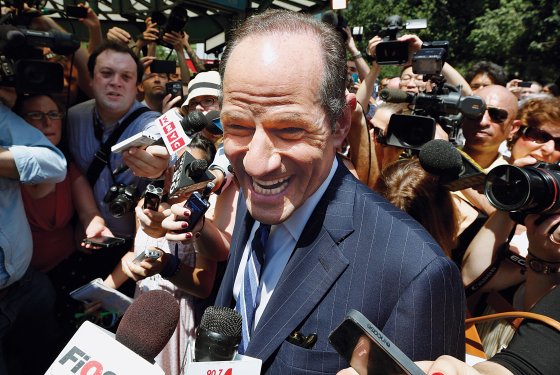
This was not a pretty picture in any way. Eliot Spitzer was standing on the southwest side of Union Square, wearing a navy pin-striped wool suit and sweating profusely, surrounded by a pushing, shoving scrum of 50 reporters. Hecklers lobbed insults: “Eliot! Why were you late? Were you with a hooker?” Spitzer tried to ignore the shouts and obscenities and the Post’s Andrea Peyser; he answered questions for more than an hour. His enormous forehead looked badly in need of sunscreen. The chaotic event, coming hours after a Sunday-night interview with the Times in which Spitzer declared his intention to jump into the comptroller’s race—and with only four days to collect thousands of signatures to qualify for the primary ballot—made the disgraced governor’s comeback campaign appear slapdash. No staff or security was visible to give the event a semblance of organization. Most glaringly absent was the candidate’s long-suffering wife, Silda, who didn’t even release a written statement of support. It was just Spitzer, taking the punishment. This was not the typical political playbook. Which is why, inadvertently, the messy rollout may turn out to be genius politics.
We’re in a deeply weird election year, in case you hadn’t noticed. First came the return of Anthony Weiner, running for mayor two years after sending lewd pictures over Twitter, lying about it, and resigning from Congress. Now there’s Spitzer, who quit the governor’s office in 2008 after he was caught sleeping with prostitutes. Spitzer’s return wasn’t quite as hasty as it appeared this week. He’d done private polling during the past two years, gauging whether opinions about him were changing, and had been talking with friends for at least a year about how to get back in the electoral game—though he kept his comptroller plan a secret from them until the end. Most wish him well; they also think he hasn’t changed much, despite having steamrollered his governorship into a ditch even before the sex scandal. “When it comes to his own governmental posture, how aggressive he was, he’s not apologetic,” one longtime associate says. “He doesn’t think he could have gotten it more right in Albany.” Spitzer, they say, remains both deeply analytical and wildly impulsive—and hardheaded, particularly in how the race against Scott Stringer will unfold. “Eliot assumes that because of who he is, and because he has a grasp of facts and the energy and the money and the message, that he’ll be able to mesmerize people so much he won’t have to answer the hard questions,” a friend says. “But you’ve got to answer ‘Do you live with your wife?’ That’s fairly basic.”
The prevailing narrative, so far, has been about whether voters are willing to forgive Weiner and Spitzer. And that’s certainly part of the horse-race equation. The former seems to have a lower bar to clear: Weiner’s sexting came off as offensive and stupid but silly. The latter committed adultery and may have broken interstate sex-trafficking laws. Spitzer also fell from a much greater height, having been elected in a landslide on the promise that he was going to clean up state government. “The disappointment with Eliot was really profound for a lot of people,” a Democratic colleague says. “And I don’t know that it’s gone.”
Weiner has run a smart campaign so far, and he’s benefited enormously from a glut of free media coverage. But the meaning of his improbable strength in the polls—the most recent round had Weiner in first place or tied for first—is that there’s a substantial appetite for an unorthodox candidate. Maybe it’s because voters find the rest of the field of political lifers uninspiring, but—and here’s the strangest twist of all—maybe it’s also because of Michael Bloomberg. As a candidate and a mayor, Bloomberg has increased the expectation of independence in our leaders. Bloomberg’s independence is founded on his fortune; Weiner and Spitzer have come by theirs painfully, because of their bad behavior, and they’re as much outcasts as outsiders. They have little practical choice but to position themselves as anti-Establishment candidates, because the Establishment has long since lined up with their rivals and because they’re both go-it-alone personalities who’ve alienated allies as well as enemies. Still, they’re tapping into what’s been a big part of the 2013 context all along, and not just among the business community that was trying to rope Ray Kelly into the contest: After twelve years of a post-partisan, (mostly) merit-based mayoralty, is the city prepared to go back to having City Hall occupied by a conventional career-Democratic politician?
The same dynamic will now come into play in the comptroller’s race. Immediately after Spitzer’s announcement, Stringer’s Establishment backers rushed to issue statements of support. “I don’t know if the rallying cry for Scott is helpful for him strategically,” a Democratic consultant says. “Do you want to look like the institutional candidate right now? And Eliot will make Scott look more and more like that.” He’s already started to do that by proposing to remake the comptroller’s responsibilities in Spitzer’s own aggressive, corporation-confronting image. The gifts that made Spitzer a star as state attorney general—hiring ferocious investigators, generating pressure through headlines—could be an excellent fit in the Municipal Building. Worry about what he might accomplish rather than outrage over his transgressions is undoubtedly driving much of the anti-Spitzer animus around the city. And Wall Street, which hates Spitzer, could even give him a backhanded boost: Having the financial industry attack you is a gift when you’re appealing to a left-leaning electorate.

As political rebels, Spitzer and Weiner are highly imperfect vehicles; they’re both still Democrats, running in the Democratic primary, after spending most of their adult lives running for or occupying public office. But both will claim that their sins have set them free to be better, less encumbered politicians, even if they’re not necessarily better people. Perhaps scandal fatigue sets in and the escalating circus atmosphere eventually sends voters running to the most anodyne or adult figure in the field (ladies and gentleman, please welcome Mayor William C. Thompson Jr.!). Or maybe the might of institutional insiders will be magnified and labor-union get-out-the-vote field operations will prove decisive and Stringer will glide into a promotion after all. Yet Bloomberg, and Rudy Giuliani before him, have changed the way people think about city politics: New York is more Democratic in registration than ever before, but for twenty years straight, we’ve elected the candidate who appeared least beholden to entrenched political interests, no matter which party the candidate happened to be registered in at the moment. When Eliot Spitzer finally left Union Square earlier this week, he did it by himself, in a yellow cab. This might be the year voters want a comptroller, and a mayor, who is gutsy and crazy enough to go it alone.
Related:
Can Spitzer Change His Obit?
100-Person Poll: Spitzer Edition
How Spitzer Could Improve NYC’s Pension System
Have good intel? Send tips to intel@nymag.com.